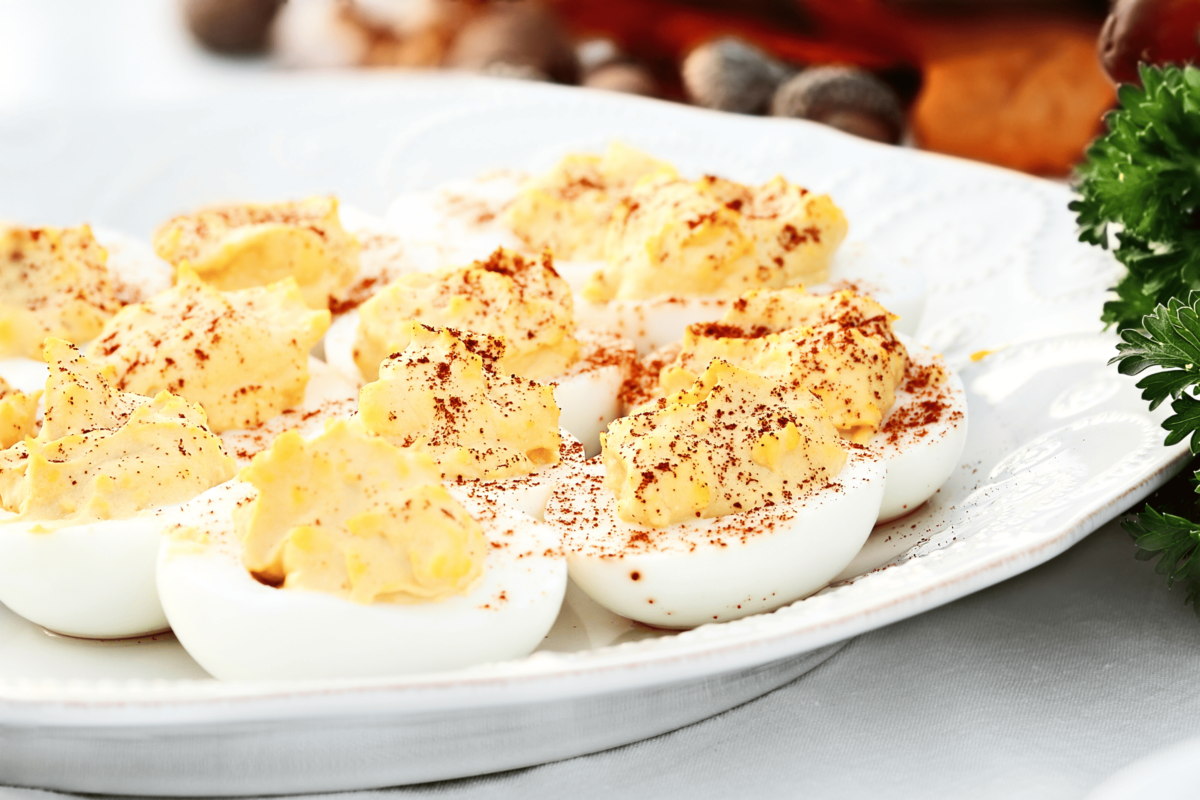Every time we sit down with a plate of deviled eggs, those familiar, hopeful eyes of our canine friends meet ours. “Can dogs eat deviled eggs?” becomes the burning question. While these eggs are a delightful treat for us, are they just as delightful and safe for our furry friends?
Understanding the Ingredients to Know the Answer to Can Dogs Eat Deviled Eggs
To answer the question, dogs can eat deviled eggs, it’s essential to examine the ingredients that go into making this popular appetizer. Deviled eggs typically consist of hard-boiled eggs, mayonnaise, mustard, salt, and various seasonings. Each ingredient plays a crucial role in the taste and texture of the final product, but how do they fare when it comes to canine consumption? Let’s take a closer look.
1. Hard-Boiled Eggs
Eggs are a fantastic source of protein and contain essential vitamins and minerals. Many commercial dog foods actually include eggs as an ingredient due to their nutritional value. However, it’s important to consider any potential allergies or sensitivities your dog may have before introducing eggs into their diet.
2. Mayonnaise
Mayonnaise, often used as a binding agent in deviled eggs, is generally safe for dogs in small quantities. However, it’s crucial to ensure that the mayonnaise does not contain any harmful additives such as garlic or onion, which can be toxic to dogs. Additionally, the high-fat content of mayonnaise means it should be given sparingly to avoid digestive issues.
3. Mustard, Salt, and Seasonings
When it comes to the mustard, salt, and seasonings used in deviled eggs, moderation is key. Mustard itself is generally safe for dogs, as long as it doesn’t contain any toxic ingredients like onions or garlic. Salt should be kept to a minimum, as excessive amounts can lead to sodium poisoning in dogs. As for other seasonings, it’s best to err on the side of caution and avoid using spices that may irritate your dog’s stomach or cause an allergic reaction.
Can Dogs Eat Deviled Eggs? Potential Risks and Considerations
While some ingredients in deviled eggs are safe for dogs, there are several factors to consider before sharing this treat with your furry friend. Here are a few potential risks and considerations to keep in mind:
1. Allergies and Sensitivities
Just like people, dogs can have allergic reactions or sensitivities to certain types of foods. Before introducing deviled eggs into your dog’s food choices, it is important to be looking for any adverse or bad reactions. Look out for symptoms such as itching, vomiting, diarrhea, or changes in behavior.
2. High-Fat Content
Deviled eggs, especially those made with mayonnaise, can be high in fat. Feeding your dog excessive amounts of high-fat foods can lead to pancreatitis, a painful and potentially life-threatening condition. It’s crucial to limit the portion size and frequency of deviled eggs to avoid any digestive complications.
3. Seasonings and Additives
The spices and additives used in deviled eggs may not agree with your dog’s digestive system. Some seasonings, such as garlic or onion powder, can be toxic to dogs. It’s essential to know exactly what goes into the deviled eggs you’re offering your dog and ensure that they are free from any harmful ingredients.
Expert Advice and Recommendations Regarding Can Dogs Eat Deviled Eggs
To make an informed decision about whether your dog can enjoy deviled eggs, it’s always best to consult with your veterinarian. They can provide personalized advice based on your dog’s specific needs and health conditions. Additionally, here are some general recommendations to keep in mind:
1. Moderation is Key
When it comes to sharing human food with your dog, moderation is key. Even if certain ingredients are safe for dogs, it’s important not to overindulge them. Treats like deviled eggs should be given sparingly and as part of a balanced diet.
2. Homemade Deviled Eggs
If you’re keen on sharing deviled eggs with your dog, consider making a homemade version specifically with your furry friend in mind. This way, you can control the ingredients and ensure that they are safe and suitable for canine consumption.
3. Alternative Treats
While deviled eggs may be tempting, there are plenty of other dog-friendly treats available that are both safe and delicious for your furry friend. Opt for treats that are specifically designed for dogs to ensure the highest level of safety and nutrition.
Frequently Asked Questions
Coming soon
Conclusion: Prioritizing Pup Health
In our journey of pet ownership, it’s tempting to share our treats with our loyal companions. But being informed and making the right choices ensures they stay with us, healthy and happy, for a long time. When in doubt, a quick chat with your veterinarian can clear things up. Always prioritize their well-being and remember, sometimes a simple treat is the best treat.
